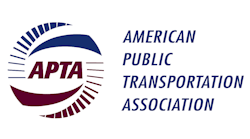The American Public Transportation Association Bus & Paratransit Conference, held in Tampa, Florida, has come to a close and transit leaders are headed back to their communities with new ideas and a renewed energy as people talked about the integral role of the industry during these transformative times.
While the news has been dominated with flying drone taxis, underground hyperloops or electric scooters revolutionizing the future of travel, the importance of bus transportation was renewed while addressing the additional evolving role of transit agencies.
All over the world, cities are making a comeback; city populations are growing. And with that comes increased density and growing congestion.
Currently public transportation carries more than 10 billion riders a year and APTA President and CEO Paul Skoutelas said, “Very few people in our communities recognize the enormity of what transit does.”
Transit leading the way in technology
Transit is pushing technology development in creating safer, more efficient ways of moving people safely.
Jeffrey Seward, Hillsborough Area Regional Transit Authority interim chief executive officer, said, “This ain’t your parent’s transit company anymore.” He continued, “We’re being asked to do different things.”
And those things were key topics of discussion throughout the conference. Electrification, data collection, autonomous operation and creating partnerships were on everyone’s agenda.
Skoutelas said, “Across the U.S. today, we have 300 electric vehicles in operation already.” When it comes to other alternative fuels, he said 30 percent are compressed natural gas and 15 percent are hybrid-electric. Compared to the auto industry, where less than 2 percent are alternative fuel. “Transit is leading the way in technology,” he stressed.
Senator Jeff Brandes (R-St. Petersburg) said he started talking to Google in 2011 and pushing legislation to think about the new transportation we’re moving toward: shared, electric and self-driving.
Brandes offered three pieces of advice to attendees. First, stop seeing your agency as a “system.”
“Systems are static,” he said. “Reimagine as an organism. Organisms change, adapt to the environment.”
Second was that partnership are key to the future. “You can’t do this all yourself,” he said.
Lastly, he said to maximize your options. “We don’t know where this is all going,” he said, “or when we’ll get there.”
He likened it to driving through the fog, that we’re not sure exactly what lies ahead. “Focus on what’s ahead of you; don’t make radical plans.
“The paradigm for mobility is shifting; it’s up to us to lead into the future.”
Facing the ridership decline
With the recent ridership trend on the decline, that was also on the forefront of discussions. Some of the main points reflected by many was that it has always been cyclical, partnerships are impacting that, and riderhship maybe shouldn’t have the excessive focus it has always held.
Skoutelas reiterated we have seen a drop-off in recent bus riderhip but, it has been after 15 years of a consecutive increase. “Have we seen anything continue to go up?” he asked. Combating the decline, he mentioned, “Countless systems have undertaken comprehensive operations analysis, reimagining their fleets, making sure the connectivity is there.
“That’s having a dramatic effect,” he stressed. “It sets the stage for what we’re talking about here – how our industry is changing, adapting and evolving to the new mobility paradigm.”
Of the new opportunities he said, “We embrace them. It’s an opportunity for us to become far more than managers of fleet -- to be mobility integrators.”
Skoutelas said, “Amazon has made it a priority to have direct access to public transit. They understand it takes a comprehensive public transit network of all modes to make these communities grow and prosper.”
While ridership is important, many are asking if that’s getting too much focus while there may be other factors that are equally, if not more, important.
While we applaud people getting out of their cars and expanding their mobility options to include transit, bicycle, walking or shared rides, some of those “rides” are then counted toward lost ridership.
APTA Chair and Jacksonville Transportation Authority Chief Executive Officer Nathaniel Ford Sr. addressed new service models, TNCs and autonomous vehicles will redefine how the industry operates and serves its communities.
He said it’s important to assess data in ways we haven’t in the past. “How do we take that data and use it to tell our stories?
To get to the point of being able to tell the story, the industry needs to better access and share its data. As Urban Engineers President & CEO Bill Thomsen said, “Data is the new gold, the new oil”
A big part of data is getting through the noise. Today’s technology produces more information than it ever has before and there is a wealth of opportunity out there, said Garrett Vandendries, director of business intelligence with Chicago Transit Authority.
The focus of transit’s outcome has to be more than simply mobility, echoed Gabe Kline, co-founder of CityFi. Public health, safety, economic development, environmental quality, livability and quality of life, and equity are the things public transportation and mobility options can offer.
One example mentioned was the initial light rail line in Phoenix, Arizona, where the citizens went to the ballot and passed to tax themselves $31.2 billion to build out a system. “The development is exploding,” Klein said. “They’re seeing the ROI.
“If you can show the ROI, you can get the business people on board.”
More from the Bus & Paratransit Conference
Technology Leading the Way in Technology
How Transit Can Create Cities People Want to Live In






